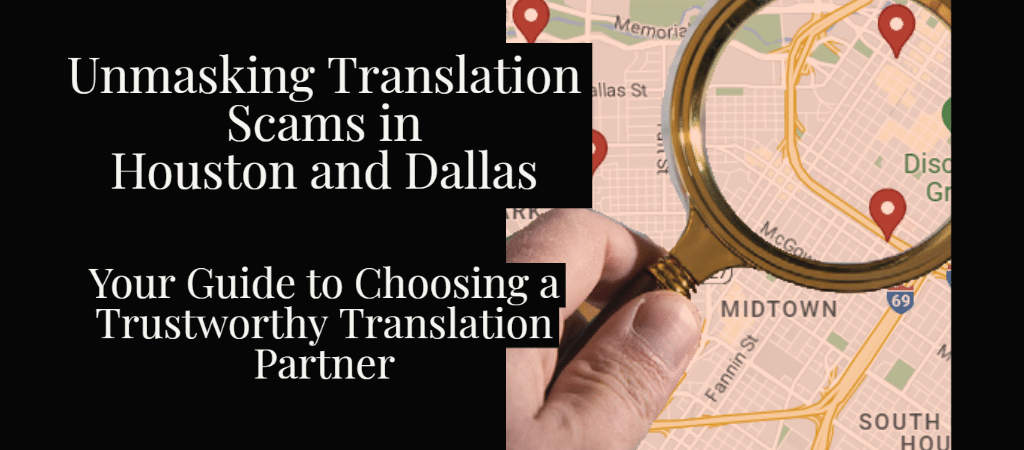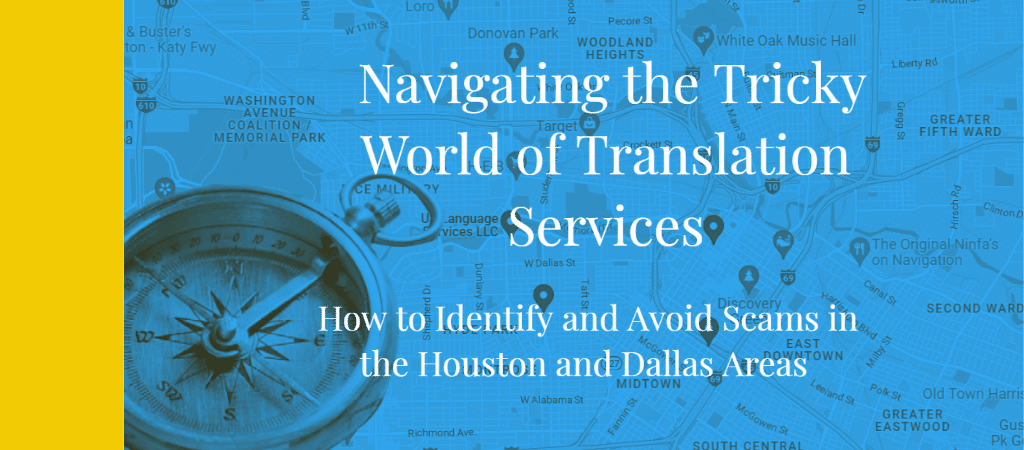
Translation scams are rampant in the language industry, and it’s easy to fall prey to unscrupulous translation companies. Many companies use virtual offices to deceive the local market that they are local, but they have no real employees within thousands of miles. These companies often produce poor translations and use deceptive pricing tactics and fake reviews to lure unsuspecting customers. In this article, we will expose some of the common translation scams in Texas, particularly those in Houston and Dallas, and show you how to avoid them. We will also tell you how our company is different from these companies and why you should choose us as your trusted translation partner.
Navigating the deceptive landscape of translation companies in Houston and Dallas
In today’s globalized world, translation services are vital for businesses and individuals alike. However, the translation industry is not without its pitfalls. In the Houston and Dallas areas, a large number of translation companies falsely claim to be local, attempting to deceive customers into believing their services are provided on-site. One company that claims to be local even fraudulently promotes “Houston Ready Translations”.
Imagine you’re shopping for Houston translation services, seeking same-day service with the pickup of original documents. Having encountered long hold times and a series of runarounds, non-specific answers to your questions, and vaguely worded excuses, you may even discover that some companies admit that their locations are strictly virtual. This means that no work is conducted at the location, no employees are present to help you when something goes wrong, and that the location serves no purpose other than to deceive consumers and businesses into thinking that translation services are genuinely carried out there.
You might also notice that when you finally get through to a human representative on the phone, it sounds like you’re speaking with someone on the other side of the world. Most likely, you are. This raises security concerns because these companies don’t have local staff. When a job comes in, it gets outsourced and sent to a vast database of usually unvetted and often non-tested translators who are asked to bid on the work. The lowest bidder is typically awarded the job, which can compromise the quality and security of your translation project.
To help you navigate this deceptive landscape, we have compiled a comprehensive guide to identify and avoid such translation companies, ensuring that you choose a reliable and trustworthy service provider:
- Research the company: Investigate the company’s online presence, including their website, social media accounts, and industry-specific forums. This will help you get a better sense of their legitimacy, customer engagement, and overall reputation.
- Verify their physical presence: If a company claims to be local, try to confirm their physical presence. Be cautious of companies using virtual offices in premium locations to create a false impression of being local.
- Check their reviews: Look for balanced reviews on multiple platforms that provide both pros and cons of the service. Be wary of overly positive or negative reviews, as they may be fabricated to boost or harm the company’s reputation.
- Assess their qualifications: Ensure the company has certified translators with relevant degrees and experience. This will guarantee that your translations are accurate and professional.
- Inquire about their quality assurance process: A reliable translation company will have a quality assurance process that includes proofreading, editing, and review by a second translator.
- Evaluate their customer service: Make sure the company has a responsive customer service team that is available to answer your questions and address your concerns.
- Compare pricing and verify word count: Be cautious of companies offering incredibly low rates and dishonestly inflating the true word count. Always verify the word count and compare rates among trustworthy providers.
- Assess their security measures: Investigate the company’s security protocols, including how they select and vet translators, and how they handle sensitive and confidential information.
By following these guidelines, you can make informed decisions when selecting a translation service provider and avoid falling prey to unethical business practices in the Houston and Dallas areas.

How these companies produce poor translations and fail in other ways
Poor translations can have serious consequences for your business or personal needs. They can damage your reputation, credibility, and trustworthiness with your clients, partners, or audience. They can also cause misunderstandings, confusion, or errors that can lead to legal problems, financial losses, or missed opportunities.
Some examples of poor translations that we have seen from these companies using virtual addresses in Houston and Dallas are:
- Translating “innocent” as “not innocent” in Spanish
- Translating “no smoking” as “no breathing” in Arabic
- Translating “do not disturb” as “don’t bother me” in Chinese
- Translating “welcome” as “goodbye” in Japanese
- Translating “please wait here” as “please die here” in Spanish
- Translating “I love you” as “I like you very much” in French
These are just some of the frightening, hilarious, but also embarrassing and dangerous mistakes that these companies make. There are also more subtle but equally important errors such as grammar mistakes, spelling errors, punctuation errors, word choice errors, tone errors, etc. Much of this is due to their over-reliance on machine translation.
These companies not only produce poor translations but also fail in other ways such as:
- Advertising ridiculously low-rates, but inflating the true word count so you pay more than you would with another company.
- Hiding hidden costs such as charging credit card processing fees
- Providing poor customer service and not answering phones
- Ignoring feedback or complaints

How these companies use deceptive pricing tactics and fake reviews
Another way these companies scam their customers is by using deceptive pricing tactics and fake reviews. They often advertise low prices on their websites or online platforms but then add extra charges for things like formatting, proofreading, editing, localization, transcription, subtitling, etc.
How to detect a company relying heavily on fake reviews
Companies that use virtual offices while claiming to be local, engage in pricing scams, or adopt other unethical practices often resort to fake reviews to bolster their image and reputation. They might create the reviews themselves, pay others to write them, or use bots to generate them. They may also delete negative reviews or block users who leave unfavorable feedback.
Such dishonest practices are not only unethical and illegal, but they also deceive consumers and breach their rights, fair trade laws, and professional standards. Although it may be challenging to prove these actions, some signs are evident.
To ensure you make well-informed decisions when choosing a service provider, it’s essential to identify companies that heavily rely on fake reviews. Follow these key steps to spot potential fake reviews and avoid companies engaging in deceitful practices:
- Analyze review history: Examine the review history of users who have rated the company. Look for irregularities and patterns, such as consistent reviews in one city followed by a sudden shift to another location. This could indicate a manufactured review.
- Check for generic or repetitive language: Fake reviews often lack detail and resort to generic or repetitive phrasing. Authentic reviews tend to offer specifics about the service, personal experiences, or interactions with the company.
- Investigate reviewer profiles: Evaluate the credibility of reviewer profiles. A newly created account or one with few reviews posted in a short timeframe might signal a fake account established for misleading reviews.
- Assess the company’s online presence: Examine the company’s website, social media accounts, and industry-specific forums to gain insights into their legitimacy, customer engagement, and overall reputation.
- Be wary of extreme reviews: Overly positive or negative reviews could be falsified to boost the company’s image or damage competitors. Seek balanced reviews that outline both the advantages and drawbacks of the service.
- Identify discrepancies in location and images: If a company claims to be local but operates from a virtual office in a high-end area, exercise caution. Be particularly wary if they showcase images of the virtual office provider’s reception desk or shared spaces, as this might suggest an attempt to deceive potential clients.
- Cross-reference multiple review platforms: Don’t rely on a single review platform. Consult various sources to gather a comprehensive understanding of the company’s reputation and customer satisfaction levels.
By adopting these strategies, you can better recognize companies that may use fake reviews to falsely represent their quality and reputation. This will assist you in making informed decisions when choosing a service provider and protect you from unethical business practices.
8 Steps to Dodge Translation Scams and Select a Trustworthy Translation Company
Armed with the knowledge of common translation scams, it’s time to learn how to sidestep them and opt for a dependable translation company. Follow these tips:
- Investigate reviewers: Examine the profiles of people who have reviewed the company to ensure their authenticity and credibility.
- Request samples: Ask the company for work samples to gauge their translation quality. A reputable translation company will gladly share samples with you.
- Verify credentials: Ensure the company employs certified translators with relevant degrees and experience, which guarantees accurate and professional translations.
- Seek a quality assurance process: A trustworthy translation company will have a quality assurance process in place, including proofreading, editing, and review by a second translator.
- Assess customer service: Confirm that the company has a responsive customer service team available to address your questions and concerns.
- Approach per-word pricing with care: Although per-word pricing is generally considered the most transparent and honest pricing method, be aware of companies that offer incredibly low rates and compensate by dishonestly inflating the true word count. This can lead to customers thinking they are paying less, but they ultimately pay more than they would elsewhere. Always verify the word count and compare rates among trustworthy providers.
- Beware of overpromising: Exercise caution with companies that promise too much, as no translation is 100% accurate, and some nuances may be lost in translation.
- Watch for hidden fees: Ensure there are no hidden charges, such as credit card processing fees or rush job fees.
Conclusion
In conclusion, choosing a reliable translation company is crucial for the success of your business or personal needs. By following these tips and avoiding translation scams, you can ensure that your translations are accurate, professional, and meet your expectations.
At 24 Hour Translation Services, we understand the importance of reliable and accurate translations for our clients’ needs. That’s why we have a team of certified translators with relevant degrees and experience, a rigorous quality assurance process, and responsive customer service. We charge by the source word, and we are transparent about our pricing.
We provide a wide range of translation services, including legal, medical, technical, and business translations, as well as interpretation services. Our translators are experts in their fields and have a deep understanding of the cultural nuances that are essential for accurate translations.
In addition to our translation services, we also offer localization services to help our clients adapt their content to specific cultures and regions. Localization involves not only translating content but also adapting it to local customs, idioms, and conventions. This is essential for businesses that want to expand their reach and connect with new audiences.
We use the latest translation technology, such as Translation Memory and Terminology Management, to ensure consistency and accuracy across all translations. We also offer rush services for urgent projects and have a 24/7 online ordering system for convenience.
At 24 Hour Translation Services, we are committed to providing our clients with reliable and accurate translations that meet their specific needs. We understand the challenges of translation and the importance of cultural awareness, and we strive to deliver the highest quality translations possible.
In conclusion, if you need translation services, it’s essential to choose a reliable and trustworthy translation company to ensure that your translations are accurate, professional, and meet your expectations. By following the tips outlined in this article and choosing a company like 24 Hour Translation Services, you can avoid translation scams and have peace of mind knowing that your translations are in good hands.
